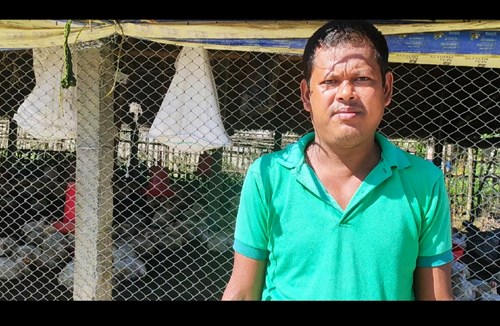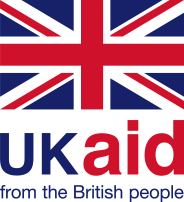Mohammad Mustafa, 27, from Yamunamai Rural Municipality in Rautahat, Province 2, returned home in 2017 after working as a migrant in Saudi Arabia. Once back, he set up a shop that provides electronics repair and plumbing services and supply of electrical goods. As demand surged, Mustafa (picture on right) needed additional capital for business expansion. Familiar with the informal credit system, he approached a few known lenders in his village, all of whom quoted a whopping 36% interest rate; a high-debt trap he did not want to fall into. Through a local FM station, he then learnt of UKaid सीप partner Prabhu Bank’s migrant-focused financial products. Within a month, Mustafa’s loan application of NPR 10,00,000 (£6,897) was approved at an interest rate of 4.39%.
Harnessing the Potential of Returnee Migrants to Expand Rural Enterprises and Livelihoods
Mohammad was able to avail a loan product that had been especially designed through UKaid सीप’s support for foreign labor returnee migrants. An affordable, collateral-free, and used a simplified application process, all of which aligned with his interests and needs. The loan application process and the support he received from the Bank was tailored too, making this service from Prabhu Bank different from other loan products available in the market. Over the course of its pilot period partnership with सीप, Prabhu Bank has extended a wide array of financial services to nearly 11,000 Nepalis. Today, Mustafa’s business is growing; he has added new staff and diversified his business. He’s also bringing home, for the first time, an average monthly savings of NPR 45,000 (£310). More than anything, Mustafa is excited about the prospects of staying productive and employed within the country itself, while also creating new jobs for local youth.
Temporary labour migration is a prominent feature of Nepal’s migration profile. Over 4 million work permits have been released by the GoN since 2008. Wage differentials—two times higher wage levels in the destination countries—is among the major push factor of migration for Nepalis. But there are risks: the potential for exploitation during recruitment and employment is high, and there is often a little guarantee of on-the-job safety or respect for the rights of the migrant workers. Due to missing markets i.e., unavailability of formal and affordable financing options, these migrants are dependent on informal money lenders and vulnerable to exploitation and excessive borrowing costs—over 36% and equivalent to almost two years of earnings for unskilled migrants. On the other side, remittances sent by labour migrants are mostly used in consumption and purchase of real estate/ housing in the absence of locally viable investment opportunities or financial products offered to them.
In this context, with support from UKaid सीप, two other partners – Laxmi Bank and Sana Kisan Bikas Laghubitta Bittiyasanstha (SKBBL) – are expanding migrant-community focused financial solutions designed to i) promote productive savings and utilization of hard-earned incomes for returnees and their families; and ii) lower the cost of migration for aspiring migrants. सीप has supported Laxmi Bank, since May 2021, in its quest to accelerate the country’s shift towards digital finance—for migrants and migrant households to better harness the benefits of migration with technology-powered remittance-based credit products. Through its micro finance partner Laxmi Laghubitta, the bank is extending financial credit and saving products—coupled with financial literacy and vocational training—to support rural-based enterprises with the finance and skills they need to start and grow their businesses, creating more local jobs in the process.
Similarly, सीप partner SKBBL has customized financial products designed to catalyze enterprise development and migration optimization for migrant communities—across 12 districts in Lumbini Province and Province 2. Through 101 partner Small Farmer Agriculture Cooperatives (SFACLs), SKBBL is extending training-linked credit products for migrants and migrant households to better access affordable enterprise-startups services. SKBBL is also expanding pre-migration credit for aspiring migrants to lower their cost of migration. Further, the pre-migration loan of up to NPR 300,000 (£2,068) is covered through an insurance to reduce the burden of loan repayment in case of injury or death during foreign employment. Through सीप’s support, SKBBL has branched out to Rolpa and Pyuthan Districts too—geographies with limited access to formal financial institutions—for the first time.
Like Mustafa, Chandrakanta Chaudhary, 34, from Kanchanpur Municipality in Saptari worked as a migrant labour. His migrant journey, however, faced a harsh start and ended abruptly. Only a few months into his job as a security guard in Malaysia, Chandra’s mandatory medical test revealed chest conditions that did not meet the medical protocols of the company. Chandra (picture on right) was compelled to take the next plane back—empty handed and debt-ridden. With SKBBL’s support, Chandra, fortunately, was able to acquire credit to grow a small poultry, fishery, and livestock business. Although off to a slow start due to the second covid wave, since January 2021, like Chandra, nearly 800 migrants have taken advantage of SKBBL’s affordable enterprise start-up loan (Samriddhi Karja) or pre-migration loan (Sunaulo Bhavisya Karja). In the post COVID context whereby Nepal is seeing unprecedented return by migrant workers, these financial services will become increasingly important.



